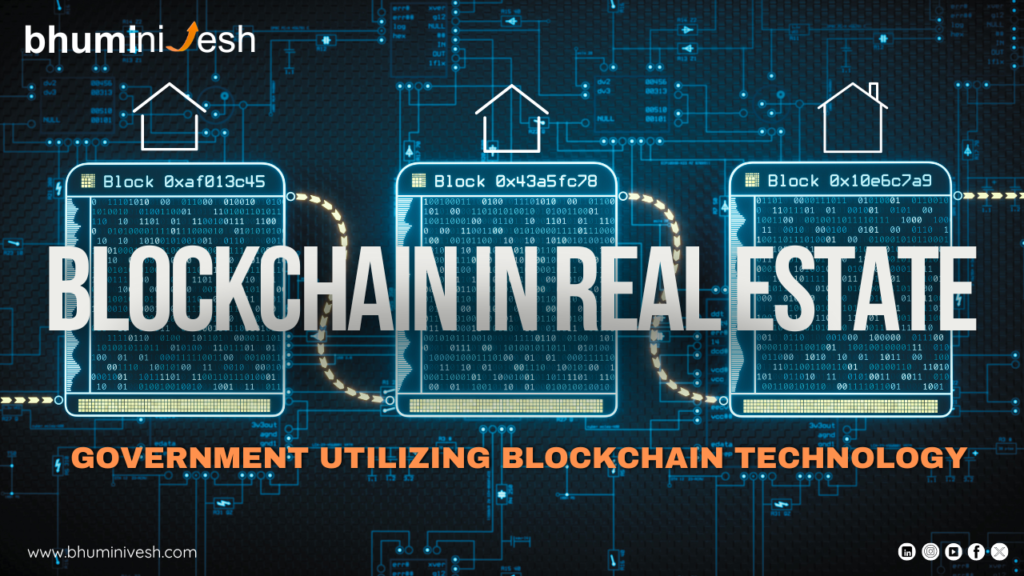
The issue of counterfeit property documents has long plagued the Indian real estate industry, resulting in widespread fraud, court cases, and financial losses for gullible purchasers. This long-standing problem has been made worse by how difficult it is to authenticate documents across departments and formats. But the emergence of blockchain technology promises to completely transform this market by bringing efficiency, security, and transparency to real estate transactions.
Issues with the Current System:
The Spread of False Documents: The widespread use of forged real estate documents has made it possible for dishonest activities including selling the same property more than once and encroaching unlawfully on vacant land.
Complicated Verification Procedures: Because property papers are verified by physical paperwork and dispersed record-keeping across departments, the process of confirming the legitimacy of property documents is laborious and time-consuming.
Middleman Abuse: Middlemen take advantage of the system frequently, charging astronomical fees and occasionally allowing transactions based on forged paperwork.
Data Vulnerability: Centralized property record storage raises the possibility of hacking and data manipulation, which poses serious risks to data security and integrity.
Legal and Financial Risks: Purchasers may be subject to legal obligations after making a purchase since they may find it difficult to determine what obligations exist on a property.

Introducing Property Chain: Blockchain’s Solution
It leverages blockchain’s decentralized ledger technology to address these critical challenges:
Immutable and Secure Ledger: Property transactions are recorded in a tamper-proof blockchain ledger, ensuring that once entered, data cannot be altered retroactively without consensus from all network participants.
Transparency and Traceability: Each transaction in the Property Chain is linked cryptographically, providing a transparent and traceable record of property ownership and transactions. This eliminates discrepancies and disputes arising from multiple claims on the same property.
Elimination of Intermediaries: Smart contracts automate and enforce property transfer agreements, reducing reliance on intermediaries and mitigating the risk of fraud associated with middlemen.
Efficient Verification: Stakeholders, including buyers, sellers, and government authorities, can verify property documents and ownership details online in real-time, streamlining the verification process and reducing delays.
Enhanced Security and Trust: Distributed storage of property records across multiple nodes ensures resilience against data tampering and hacking, enhancing overall data security and trustworthiness.
Government and Industry Collaboration:
In order for blockchain technology to fully benefit the real estate market, cooperation between government agencies, IT companies, and industry participants is essential. Projects ought to concentrate on:
Regulatory Framework: Creating precise rules and legislation pertaining to property transactions using blockchain technology. Ensuring smooth connection with the land registration and property management systems in place at the moment.
Education and Adoption: Using pilot projects, training courses, and rewards, encourage people to learn about and use blockchain technology.
These Government departments are currently working on property chain:
JHARKHAND – Department of Revenue
KARNATAKA – Revenue Department
KARNATAKA – Town Municipal Council
KARNATAKA – City Corporation
PUDUCHERRY – UT – Revenue Department
Benefits of Property Chain:
The Property Chain system benefits a number of parties, including financial institutions, governments, individuals, and property management companies, by providing a strong platform for safe, traceable property transactions.
Trustworthy Transactions: Promotes confidence amongst all stakeholders by guaranteeing traceable and unchangeable property transactions.
Streamlined Processes: By dispersing data access across departments, it is possible to process requests for mutations and subsidies more quickly.
Cost-Effectiveness: Lowers document attestation expenses by doing away with the need for third-party middlemen like notaries.
Empowerment of the Citizen: Offers citizens simple means of verifying property papers, rights, and obligations, guaranteeing legality and transparency without complications.
Security and Integrity: Provides documentation that cannot be tampered with, protecting against fraud and unlawful title modifications.
Environmental Impact: Encourages paperless transactions, which lessens the load of paperwork and contributes to environmental sustainability.

The Property Chain includes a range of document types that are necessary for property administration and verification, such as:
Sale Transactions: Documentation of real estate transactions carried out at registration offices.
Inheritance Transactions: Records started by individuals who receive property as an inheritance.
Mutations: Updates on property changes provided by revenue officers.
Surveys: Survey offices give updated survey data.
Court Orders: Decrees concerning property rights rendered by revenue or civil courts.
Rights and Liabilities: Property-related transactions involving banks and other financial organizations.
All parties involved in property transactions and management may easily access property history and dependable documentation thanks to the Property Chain, which keeps an organized record of these papers via digital signatures and secure storage.
Format / schema of the documents stored in the Blockchain
The structure and structure of property transaction papers kept in the Blockchain are intended to guarantee security, openness, and interoperability amongst different states and departments. This is how it functions:
Cryptographic Hash Value: The Blockchain stores the cryptographically hashed value of each document (such as PDF, XML, and JSON) while the documents themselves are stored in a “offchain” database. By acting as an irreversible fingerprint, this hash value confirms whether or not the document has been altered.
Customizable Schema: During onboarding, stakeholders can specify the document schema on the Property Chain platform, which accommodates a variety of data attributes needed by various state departments. This adaptability guarantees that every state can follow its own data formats and standards.
Schema Validation: When a document is submitted to the Blockchain, the platform verifies its adherence to the registered schema. This validation process ensures that the document structure and attributes conform to the predefined standards, maintaining consistency and reliability in the Blockchain records.
Recommended Attributes: While the platform supports customized schemas, it also recommends essential attributes for property and transaction details. These standardized attributes facilitate efficient verification and extraction of information by stakeholders using the Blockchain system.
Through the use of flexible schema management and cryptographic security, the Property Chain platform facilitates state-to-state property transactions with integrity and efficiency. It enables stakeholders to easily handle a variety of legal requirements and data formats while securely storing and verifying property-related information.
Source: https://blockchain.gov.in/Home/
Read More: https://blockchain.gov.in/Documents/Concept_Note_on_Property_Chain_Ver%201.1.pdf
Conclusion :
With breakthroughs like Property Chain, blockchain technology has great potential to revolutionize India’s real estate market. Blockchain can help create a more transparent, safe, and effective real estate market by tackling the long-standing issues of fraudulent property papers, inefficiencies in the verification process, and security flaws. Adopting this technology has the potential to drastically lower fraud, boost investor trust, and usher in a new era of digital change for the Indian real estate industry.



